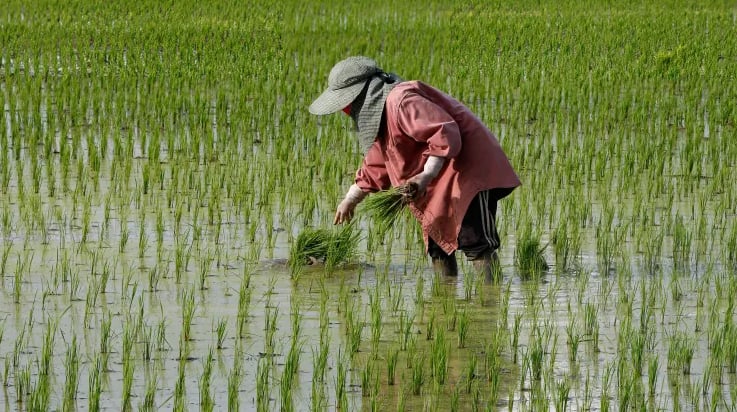June 18, 2025 | 06:11 GMT +7
June 18, 2025 | 06:11 GMT +7
Hotline: 0913.378.918
June 18, 2025 | 06:11 GMT +7
Hotline: 0913.378.918

A farmer planting rice sprouts on her rice field in Nakhon Sawan province, north of Bangkok.
Thailand is facing a spate of low rainfall. In an effort to conserve water for consumption, the Office of the National Water Resources (ONWR) has called on the country’s farmers to turn to “planting crops that use less water [which] can be harvested quickly.”
“The cumulative rainfall is about 40% less than normal, which is at high risk of water shortage,” secretary-general of the ONWR, Surasri Kidtimonton, said in a statement released by Thailand’s National Water Administration.
Kidtimonton said the country’s water management needs to “focus on water for consumption,” as well as “water for cultivation mainly for perennial crops.”
Perennial crops are crops that grow back after harvest and need not be replanted every year, unlike annual crops. Rice is categorized as an annual crop.
For every kilogram of rough rice grown, an average of 2,500 liters of water is needed. In comparison, alternative crops like millets require between 650 to 1,200 liters of water for the same amount harvested.
Just last month, India banned exports of non-basmati white rice, a move aimed at ensuring “adequate availability” in domestic markets, the government said.
India is the world’s leading rice exporter and accounts for 40% of global rice trade, and the ban is expected to affect millions.
“Global rice price will have the potential to increase further in the event that rice production in Thailand decreases significantly year on year,” Rabobank’s senior analyst Oscar Tjakra told CNBC.
However, it still remains to be seen whether Thai farmers will follow the directive, said Tjakra.
“Thai farmers might still choose to plant rice on the back of the current high global rice export prices environment,” he said.
Rice prices are already hovering at decade highs, in part due to tighter supplies when the staple became an attractive alternative as prices of other major grains surged following Russia’s invasion of Ukraine in February 2022.
“Thailand often pushes for water conservation, but it has little effect on the use of water as the water rights system has yet to be developed,” said Jeremy Zwinger, CEO of The Rice Trader told CNBC in an e-mail.
(CNBC)

(VAN) Extensive licensing requirements raise concerns about intellectual property theft.

(VAN) As of Friday, a salmonella outbreak linked to a California egg producer had sickened at least 79 people. Of the infected people, 21 hospitalizations were reported, U.S. health officials said.

(VAN) With the war ongoing, many Ukrainian farmers and rural farming families face limited access to their land due to mines and lack the financial resources to purchase needed agricultural inputs.

(VAN) Vikas Rambal has quietly built a $5 billion business empire in manufacturing, property and solar, and catapulted onto the Rich List.

(VAN) Available cropland now at less than five percent, according to latest geospatial assessment from FAO and UNOSAT.

(VAN) Alt Carbon has raised $12 million in a seed round as it plans to scale its carbon dioxide removal work in the South Asian nation.

(VAN) Attempts to bring down the price of the Japanese staple have had little effect amid a cost-of-living crisis.